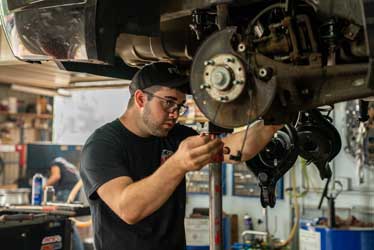All Categories
Featured
Routine engine tune-ups are important for maintaining your lorry's performance, enhancing fuel efficiency, and extending its life-span. Whether you're an experienced cars and truck owner or a beginner, recognizing the key aspects of an engine tune-up can help you keep your car running efficiently for many years. Here are some important tips to direct you with the procedure.
- Modification the Glow Plugs. Spark plugs are small but mighty elements that play an essential role in stiring up the fuel-air mixture in your engine. With time, they can use out or come to be fouled, bring about poor engine performance, decreased gas efficiency, and hard beginnings.
During a tune-up, examine your ignition system for wear and replace them as needed. For many lorries, spark plugs should be replaced every 30,000 to 100,000 miles, depending on the type and material. Fresh ignition system make certain efficient combustion and smoother engine procedure.
- Evaluate and Replace the Air Filter. The air filter is your engine's initial line of protection versus dust, debris, and various other contaminants. A clogged or dirty air filter can limit airflow, causing your engine to work more difficult and consume more gas.
Examine your air filter throughout a tune-up and replace it if it's unclean or previous its advisable solution period. A clean air filter enhances engine effectiveness and improves gas economic climate.
- Examine the Fuel System. With time, your fuel system can collect dust and carbon down payments, decreasing engine performance and gas performance. Cleaning the fuel injectors and fuel lines throughout a tune-up helps preserve proper fuel delivery and combustion.
You can utilize a fuel system cleaner or have a specialist mechanic execute a more extensive cleaning. This action is specifically advantageous for older cars or cars and trucks often driven in stop-and-go traffic.
- Inspect the Belts and Hose pipes. Belts and pipes are critical for numerous engine functions, such as running the generator, water pump, and air conditioning. Throughout a tune-up, check for splits, fraying, or signs of endure these elements.
Change any kind of damaged belts and pipes to stop prospective malfunctions. A broken belt or dripping pipe can bring about engine overheating or loss of power, so attending to these concerns immediately is important.
- Replace the Engine Oil and Oil Filter. Engine oil is crucial for lubing moving parts, decreasing rubbing, and regulating engine temperature. Over time, oil comes to be infected and sheds its efficiency.
As component of a tune-up, replace the engine oil and oil filter. Use the type of oil advised by your automobile's supplier and stay with the suggested adjustment intervals. Tidy oil keeps your engine running efficiently and protects against early wear.
- Evaluate the Battery and Billing System. A healthy and balanced battery is crucial for beginning your automobile and powering its electric systems. During a tune-up, examine the battery's voltage and examine the terminals for deterioration. Tidy the terminals if needed and make certain a safe connection.
Additionally, examination the generator and billing system to guarantee your battery stays charged during operation. If your battery is weak or old, consider replacing it to prevent unexpected failures.
- Flush and Replenish the Coolant. The cooling system controls your engine's temperature level, preventing it from overheating. Old or infected coolant can shed its performance, resulting in prospective engine damages.
During a tune-up, flush the old coolant and replace it with a fresh mixture. Also, check the radiator, thermostat, and hose pipes for leakages or damages. Maintaining the cooling system in good problem ensures your engine runs at the appropriate temperature level.

- Address Caution Lights and Uncommon Signs. Modern vehicles are furnished with analysis systems that notify you to potential concerns via dashboard warning lights. If your check engine light or any kind of other advising indications are on, address them throughout your tune-up.
Additionally, focus on unusual signs such as unusual sounds, harsh idling, or decreased fuel effectiveness. A specialist auto mechanic can diagnose and fix these troubles during the tune-up process.
- Do Not Forget the Exhaust System. Your automobile's exhaust system removes hazardous gases from the engine and makes sure correct exhausts. Check the exhaust system for leaks, corrosion, or damages throughout a tune-up. A defective exhaust system can influence engine efficiency and result in ecological and safety and security concerns.
- Use High-Quality Components and Fluids. When changing parts or covering off liquids during a tune-up, always go with high-grade items that fulfill your automobile's specs. Making use of substandard parts or wrong fluids can negatively affect your engine's performance and longevity.
Final Thought: Normal Tune-Ups Are Trick to Engine Health. Putting in the time to tune up your engine ensures it operates effectively, saves gas, and lowers the risk of break downs. Whether you carry out these tasks yourself or depend on a trusted auto mechanic, routine tune-ups are a financial investment in your lorry's dependability and longevity. Adhere to these tips, and you'll take pleasure in a smoother, extra reliable experience for many years to come.
Latest Posts
Uncover the Premier Auto Repair Offers in Montclare, Chicago
Improve Your Residential Property with Expenses Door Solution
Discover Reduce Expenses on Car Maintenance with Montclare Auto Repair’s Special Deals
More
Latest Posts
Uncover the Premier Auto Repair Offers in Montclare, Chicago
Improve Your Residential Property with Expenses Door Solution
Discover Reduce Expenses on Car Maintenance with Montclare Auto Repair’s Special Deals